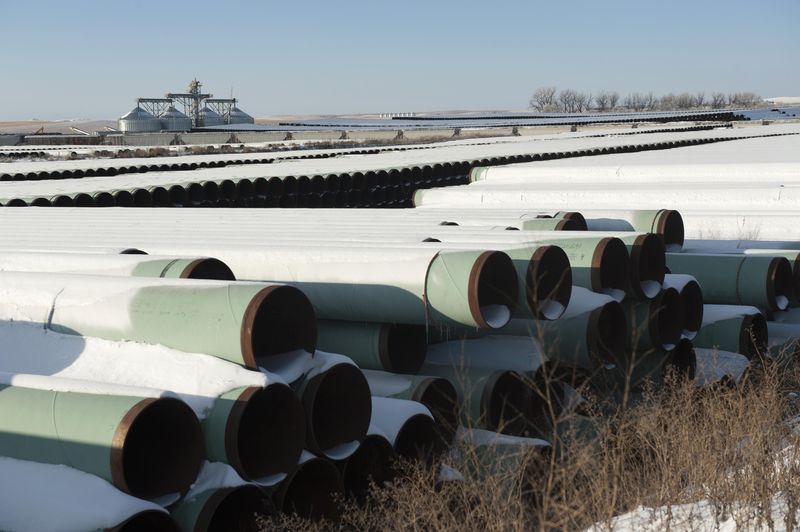By Ayesha Rascoe
WASHINGTON, Jan 7 (Reuters) - TransCanada Corp TRP.TO
faces a rocky legal path as it seeks to overturn President
Barack Obama's denial of its Keystone XL pipeline or at least
recoup some of its lost investment in the multibillion dollar
project.
The Canadian company filed a lawsuit in federal court in
Texas on Wednesday, asking the court to declare the White House
decision unlawful. Separately, TransCanada announced its intent
to issue a claim under the North American Free Trade Agreement
(NAFTA) for $15 billion in damages.
Both cases face an uphill battle, but international trade
lawyers say the high-profile U.S. political battle over the
pipeline may help TransCanada's claims of unfair treatment under
NAFTA.
The trade agreement between Canada, Mexico and the United
States allows investors from those countries to seek damages
when they feel they have been discriminated against or treated
unfairly by one of the other NAFTA member nations.
TransCanada contends that the United States "unjustifiably"
discriminated against the Keystone project and had previously
approved pipelines from other investors in a shorter amount of
time and under different criteria than applied to Keystone.
Under NAFTA, investor-state challenges are decided by a
three-person panel composed of private arbitrators chosen by the
parties involved in the dispute. The tribunal has no power to
alter the White House's decision, but can award damages.
The Keystone XL was designed to link existing pipeline
networks in Canada and the United States to bring crude from
Alberta and North Dakota to refineries in Illinois and,
eventually, the Gulf of Mexico coast. It sparked widespread
opposition from environmental groups and a tug-of-war over its
approval between Republicans and Democrats.
Obama rejected the project in November, seven years after it
was first proposed, saying it would undercut the country's
global leadership in fighting climate change by promoting the
import of carbon-intensive oil sands crude.
The United States has faced more than a dozen challenges by
investors claiming unfair treatment under the trade deal, but
has to date never lost such a case.
White House spokesman Josh Earnest trumpeted that success
record on Thursday when asked about the potential NAFTA case.
"We are confident that the decision that was made vis-à-vis
the Keystone pipeline is entirely consistent with all of our
international obligations, including our obligations under
NAFTA," Earnest told reporters.
LITTLE CHANCE CHALLENGES WILL SUCCEED
Some factors involved in the review process for Keystone may
play in TransCanada's favor in the trade case, analysts said.
Public statements from U.S. lawmakers and the White House
stressing the importance of domestic oil production over
Canadian crude may support claims of discrimination on basis of
nationality, said Mark Warner, an international trade lawyer.
"I think it's the strongest case to go forward against the
United States, but the chances of success are still very low,"
said Warner.
Simon Lester, a trade policy analyst with libertarian think
tank Cato Institute, said TransCanada's claim that the project
denial was arbitrary might be bolstered because the
administration essentially blocked transport of Canadian oil
sands crude via one pipeline, but not rail or other methods.
"There will be a bit of reluctance to find against the
United States on such a high-profile case, but tribunal judges
should not completely ignore the facts of the law," Lester said.
Separately, TransCanada's federal court case against the
Obama administration argues that Obama's decision was
unconstitutional and challenges the president's authority to
unilaterally block construction of a cross-border pipeline for
reasons not directly related to the physical project.
Other federal lawsuits have challenged the approval of
presidential permits for cross-border oil pipelines and mostly
focused on environmental issues and alleged violations of
administrative law. Courts in those cases have generally said
the permitting process falls under the president's
Constitutional authority to conduct foreign policy.
Alan Dunn, an international trade lawyer at Stewart and
Stewart and former U.S. assistant secretary of commerce, said it
was "novel and intriguing" that TransCanada was challenging the
president's decision on Constitutional rather than procedural
grounds.
TransCanada's suit "may break some new paths in the
jurisprudence of international agreements," said Dunn.
<^^^^^^^^^^^^^^^^^^^^^^^^^^^^^^^^^^^^^^^^^^^^^^^^^^^^^^^^^^^
BREAKINGVIEWS-TransCanada $15 bln pipeline claim a worthy gamble
^^^^^^^^^^^^^^^^^^^^^^^^^^^^^^^^^^^^^^^^^^^^^^^^^^^^^^^^^^^>
